Entrepreneurship and Small Business Management: A Comprehensive Analysis
VerifiedAdded on 2024/06/05
|17
|3888
|120
AI Summary
This assignment delves into the multifaceted world of entrepreneurship and small business management. It explores different types of entrepreneurial ventures, analyzes the impact of micro and small businesses on the economy, and examines the importance of entrepreneurial personality traits and motivation. The assignment also investigates how family background and past experiences can influence entrepreneurial success.
Contribute Materials
Your contribution can guide someone’s learning journey. Share your
documents today.

ENTREPRENEURSHIP AND
SMALL BUSINESS MANAGEMENT
SMALL BUSINESS MANAGEMENT
Secure Best Marks with AI Grader
Need help grading? Try our AI Grader for instant feedback on your assignments.
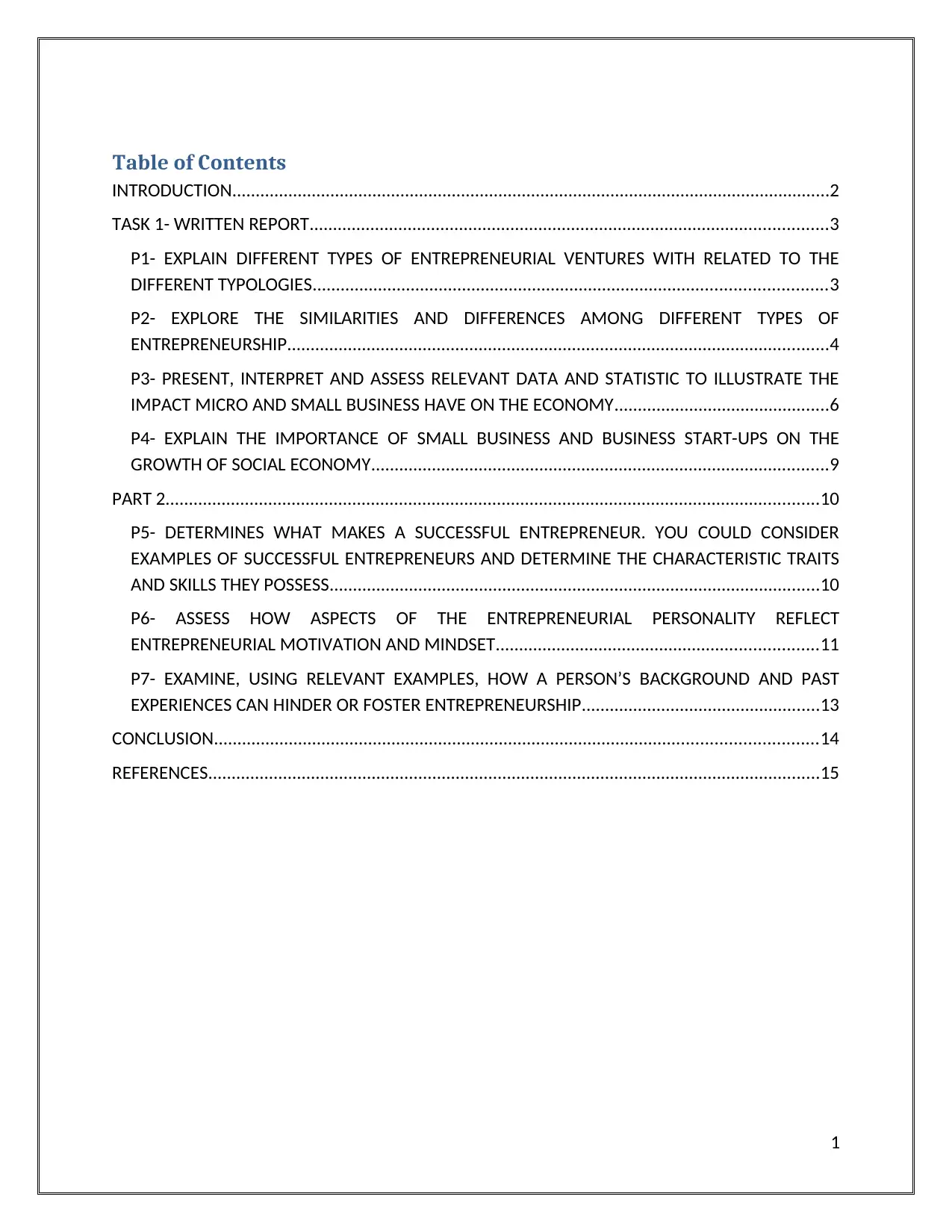
Table of Contents
INTRODUCTION................................................................................................................................2
TASK 1- WRITTEN REPORT...............................................................................................................3
P1- EXPLAIN DIFFERENT TYPES OF ENTREPRENEURIAL VENTURES WITH RELATED TO THE
DIFFERENT TYPOLOGIES..............................................................................................................3
P2- EXPLORE THE SIMILARITIES AND DIFFERENCES AMONG DIFFERENT TYPES OF
ENTREPRENEURSHIP....................................................................................................................4
P3- PRESENT, INTERPRET AND ASSESS RELEVANT DATA AND STATISTIC TO ILLUSTRATE THE
IMPACT MICRO AND SMALL BUSINESS HAVE ON THE ECONOMY..............................................6
P4- EXPLAIN THE IMPORTANCE OF SMALL BUSINESS AND BUSINESS START-UPS ON THE
GROWTH OF SOCIAL ECONOMY..................................................................................................9
PART 2............................................................................................................................................10
P5- DETERMINES WHAT MAKES A SUCCESSFUL ENTREPRENEUR. YOU COULD CONSIDER
EXAMPLES OF SUCCESSFUL ENTREPRENEURS AND DETERMINE THE CHARACTERISTIC TRAITS
AND SKILLS THEY POSSESS.........................................................................................................10
P6- ASSESS HOW ASPECTS OF THE ENTREPRENEURIAL PERSONALITY REFLECT
ENTREPRENEURIAL MOTIVATION AND MINDSET.....................................................................11
P7- EXAMINE, USING RELEVANT EXAMPLES, HOW A PERSON’S BACKGROUND AND PAST
EXPERIENCES CAN HINDER OR FOSTER ENTREPRENEURSHIP...................................................13
CONCLUSION.................................................................................................................................14
REFERENCES...................................................................................................................................15
1
INTRODUCTION................................................................................................................................2
TASK 1- WRITTEN REPORT...............................................................................................................3
P1- EXPLAIN DIFFERENT TYPES OF ENTREPRENEURIAL VENTURES WITH RELATED TO THE
DIFFERENT TYPOLOGIES..............................................................................................................3
P2- EXPLORE THE SIMILARITIES AND DIFFERENCES AMONG DIFFERENT TYPES OF
ENTREPRENEURSHIP....................................................................................................................4
P3- PRESENT, INTERPRET AND ASSESS RELEVANT DATA AND STATISTIC TO ILLUSTRATE THE
IMPACT MICRO AND SMALL BUSINESS HAVE ON THE ECONOMY..............................................6
P4- EXPLAIN THE IMPORTANCE OF SMALL BUSINESS AND BUSINESS START-UPS ON THE
GROWTH OF SOCIAL ECONOMY..................................................................................................9
PART 2............................................................................................................................................10
P5- DETERMINES WHAT MAKES A SUCCESSFUL ENTREPRENEUR. YOU COULD CONSIDER
EXAMPLES OF SUCCESSFUL ENTREPRENEURS AND DETERMINE THE CHARACTERISTIC TRAITS
AND SKILLS THEY POSSESS.........................................................................................................10
P6- ASSESS HOW ASPECTS OF THE ENTREPRENEURIAL PERSONALITY REFLECT
ENTREPRENEURIAL MOTIVATION AND MINDSET.....................................................................11
P7- EXAMINE, USING RELEVANT EXAMPLES, HOW A PERSON’S BACKGROUND AND PAST
EXPERIENCES CAN HINDER OR FOSTER ENTREPRENEURSHIP...................................................13
CONCLUSION.................................................................................................................................14
REFERENCES...................................................................................................................................15
1
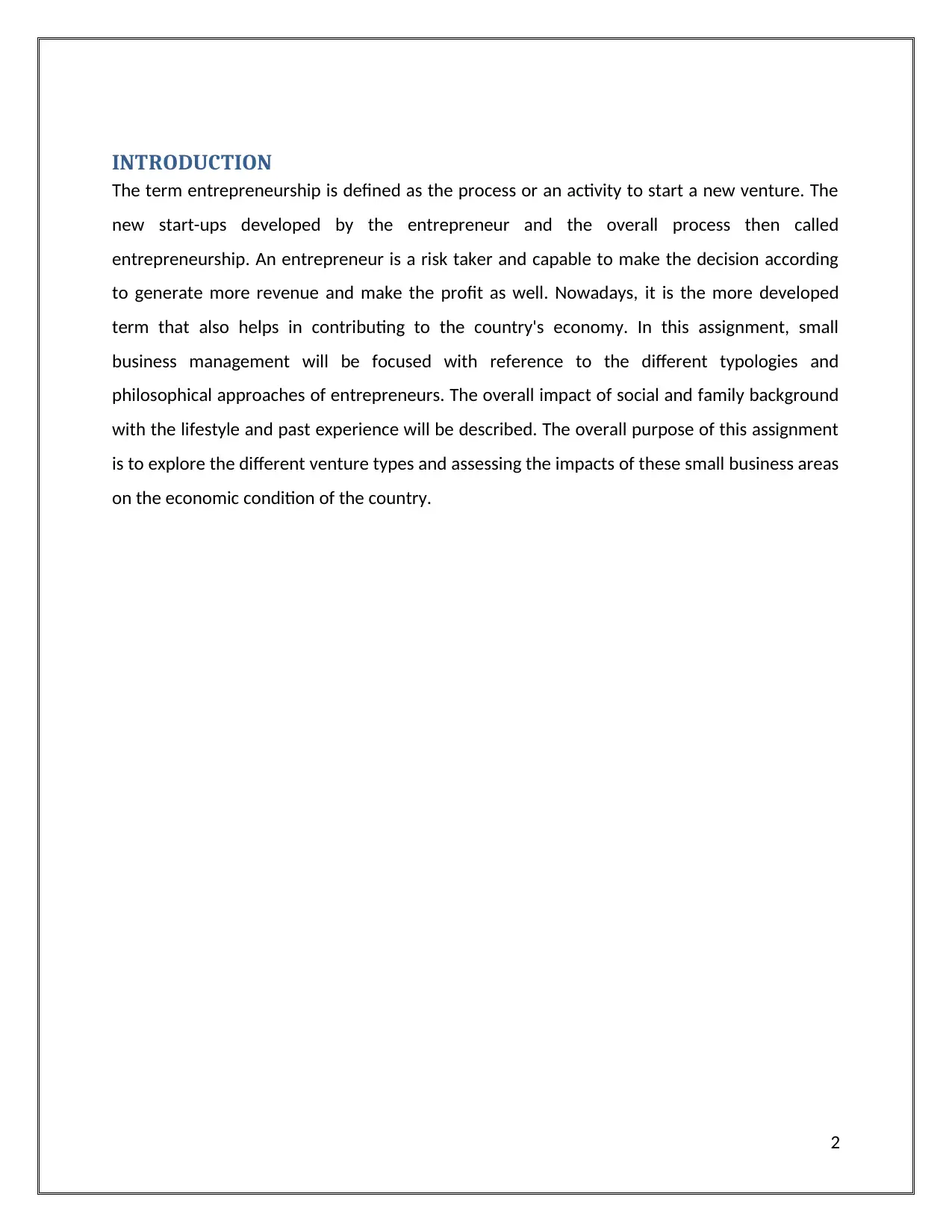
INTRODUCTION
The term entrepreneurship is defined as the process or an activity to start a new venture. The
new start-ups developed by the entrepreneur and the overall process then called
entrepreneurship. An entrepreneur is a risk taker and capable to make the decision according
to generate more revenue and make the profit as well. Nowadays, it is the more developed
term that also helps in contributing to the country's economy. In this assignment, small
business management will be focused with reference to the different typologies and
philosophical approaches of entrepreneurs. The overall impact of social and family background
with the lifestyle and past experience will be described. The overall purpose of this assignment
is to explore the different venture types and assessing the impacts of these small business areas
on the economic condition of the country.
2
The term entrepreneurship is defined as the process or an activity to start a new venture. The
new start-ups developed by the entrepreneur and the overall process then called
entrepreneurship. An entrepreneur is a risk taker and capable to make the decision according
to generate more revenue and make the profit as well. Nowadays, it is the more developed
term that also helps in contributing to the country's economy. In this assignment, small
business management will be focused with reference to the different typologies and
philosophical approaches of entrepreneurs. The overall impact of social and family background
with the lifestyle and past experience will be described. The overall purpose of this assignment
is to explore the different venture types and assessing the impacts of these small business areas
on the economic condition of the country.
2
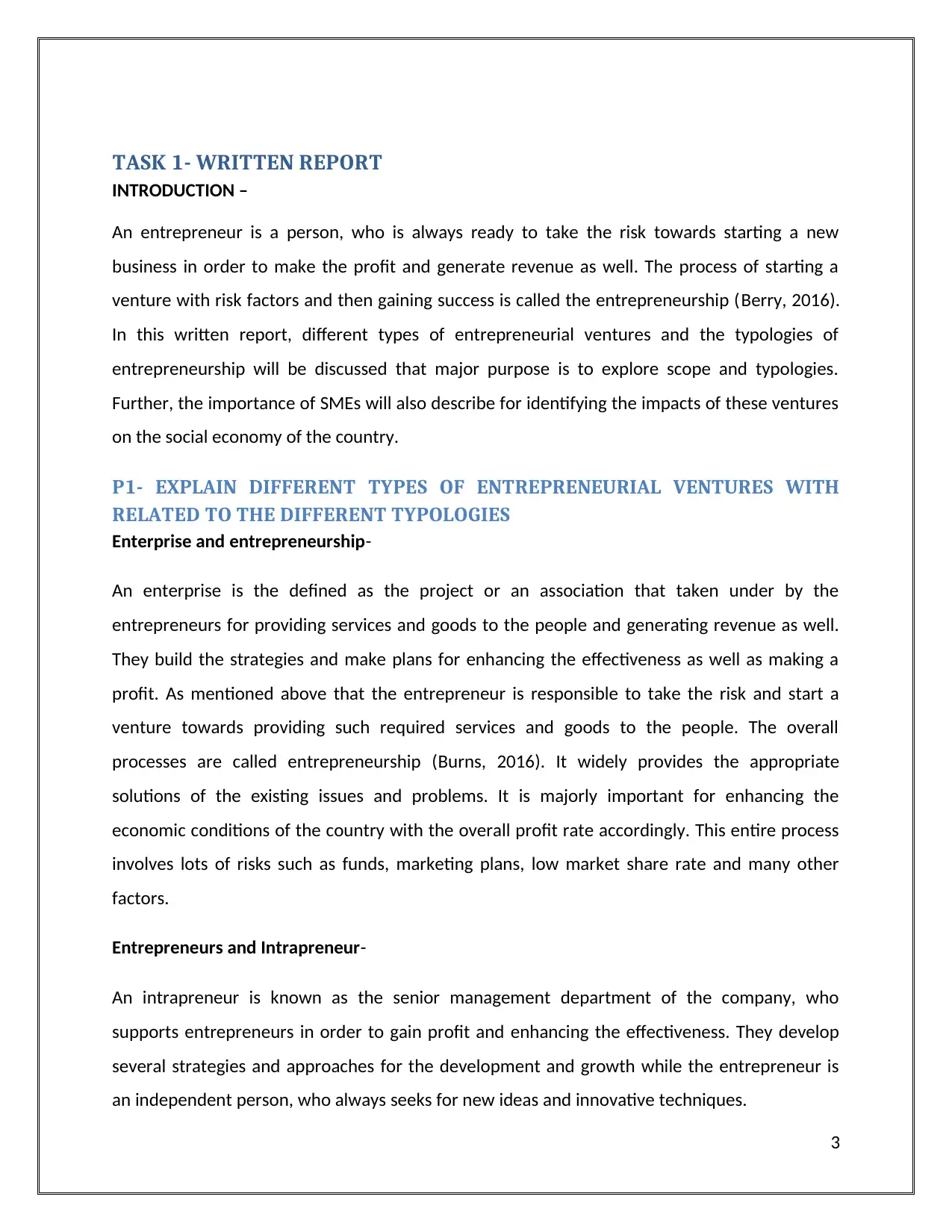
TASK 1- WRITTEN REPORT
INTRODUCTION –
An entrepreneur is a person, who is always ready to take the risk towards starting a new
business in order to make the profit and generate revenue as well. The process of starting a
venture with risk factors and then gaining success is called the entrepreneurship (Berry, 2016).
In this written report, different types of entrepreneurial ventures and the typologies of
entrepreneurship will be discussed that major purpose is to explore scope and typologies.
Further, the importance of SMEs will also describe for identifying the impacts of these ventures
on the social economy of the country.
P1- EXPLAIN DIFFERENT TYPES OF ENTREPRENEURIAL VENTURES WITH
RELATED TO THE DIFFERENT TYPOLOGIES
Enterprise and entrepreneurship-
An enterprise is the defined as the project or an association that taken under by the
entrepreneurs for providing services and goods to the people and generating revenue as well.
They build the strategies and make plans for enhancing the effectiveness as well as making a
profit. As mentioned above that the entrepreneur is responsible to take the risk and start a
venture towards providing such required services and goods to the people. The overall
processes are called entrepreneurship (Burns, 2016). It widely provides the appropriate
solutions of the existing issues and problems. It is majorly important for enhancing the
economic conditions of the country with the overall profit rate accordingly. This entire process
involves lots of risks such as funds, marketing plans, low market share rate and many other
factors.
Entrepreneurs and Intrapreneur-
An intrapreneur is known as the senior management department of the company, who
supports entrepreneurs in order to gain profit and enhancing the effectiveness. They develop
several strategies and approaches for the development and growth while the entrepreneur is
an independent person, who always seeks for new ideas and innovative techniques.
3
INTRODUCTION –
An entrepreneur is a person, who is always ready to take the risk towards starting a new
business in order to make the profit and generate revenue as well. The process of starting a
venture with risk factors and then gaining success is called the entrepreneurship (Berry, 2016).
In this written report, different types of entrepreneurial ventures and the typologies of
entrepreneurship will be discussed that major purpose is to explore scope and typologies.
Further, the importance of SMEs will also describe for identifying the impacts of these ventures
on the social economy of the country.
P1- EXPLAIN DIFFERENT TYPES OF ENTREPRENEURIAL VENTURES WITH
RELATED TO THE DIFFERENT TYPOLOGIES
Enterprise and entrepreneurship-
An enterprise is the defined as the project or an association that taken under by the
entrepreneurs for providing services and goods to the people and generating revenue as well.
They build the strategies and make plans for enhancing the effectiveness as well as making a
profit. As mentioned above that the entrepreneur is responsible to take the risk and start a
venture towards providing such required services and goods to the people. The overall
processes are called entrepreneurship (Burns, 2016). It widely provides the appropriate
solutions of the existing issues and problems. It is majorly important for enhancing the
economic conditions of the country with the overall profit rate accordingly. This entire process
involves lots of risks such as funds, marketing plans, low market share rate and many other
factors.
Entrepreneurs and Intrapreneur-
An intrapreneur is known as the senior management department of the company, who
supports entrepreneurs in order to gain profit and enhancing the effectiveness. They develop
several strategies and approaches for the development and growth while the entrepreneur is
an independent person, who always seeks for new ideas and innovative techniques.
3
Secure Best Marks with AI Grader
Need help grading? Try our AI Grader for instant feedback on your assignments.
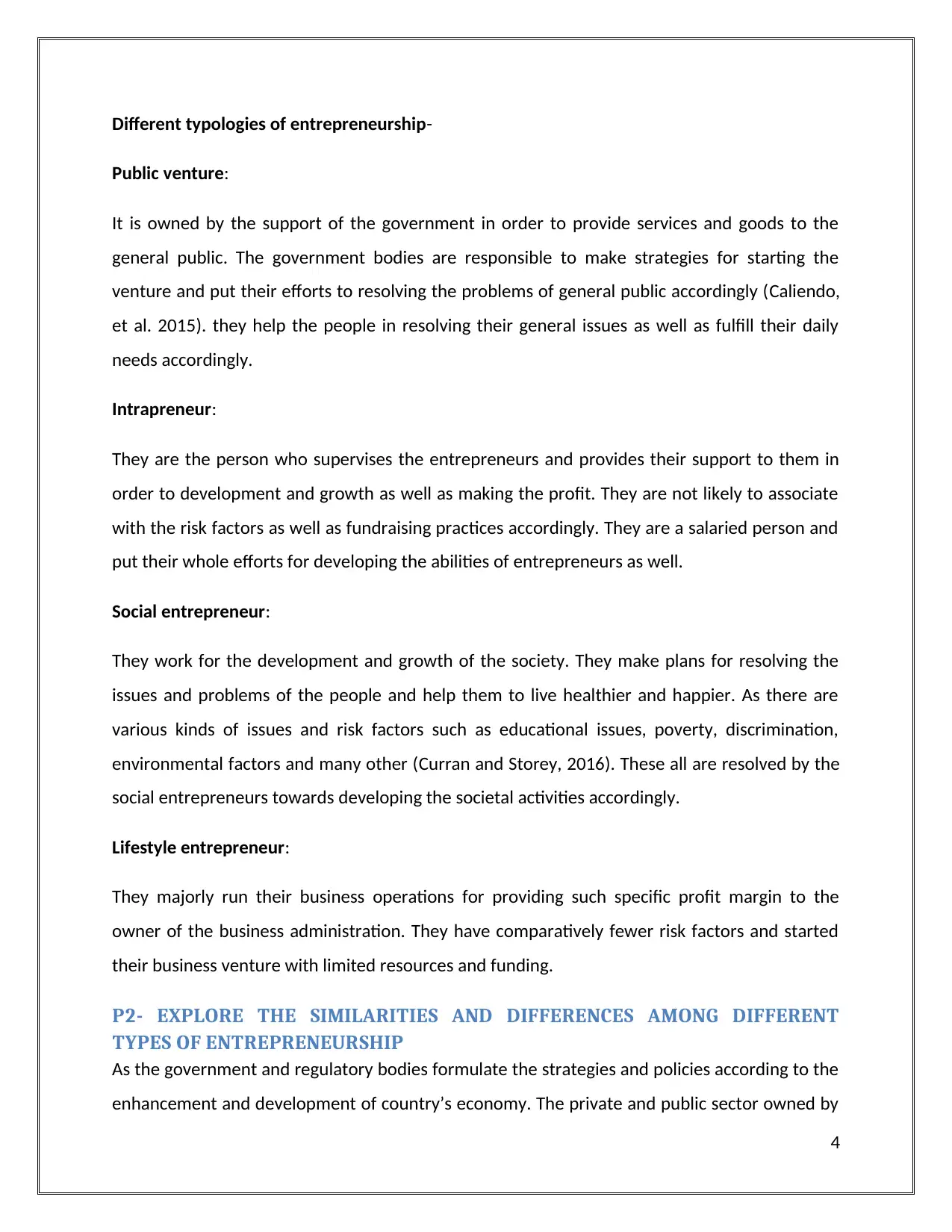
Different typologies of entrepreneurship-
Public venture:
It is owned by the support of the government in order to provide services and goods to the
general public. The government bodies are responsible to make strategies for starting the
venture and put their efforts to resolving the problems of general public accordingly (Caliendo,
et al. 2015). they help the people in resolving their general issues as well as fulfill their daily
needs accordingly.
Intrapreneur:
They are the person who supervises the entrepreneurs and provides their support to them in
order to development and growth as well as making the profit. They are not likely to associate
with the risk factors as well as fundraising practices accordingly. They are a salaried person and
put their whole efforts for developing the abilities of entrepreneurs as well.
Social entrepreneur:
They work for the development and growth of the society. They make plans for resolving the
issues and problems of the people and help them to live healthier and happier. As there are
various kinds of issues and risk factors such as educational issues, poverty, discrimination,
environmental factors and many other (Curran and Storey, 2016). These all are resolved by the
social entrepreneurs towards developing the societal activities accordingly.
Lifestyle entrepreneur:
They majorly run their business operations for providing such specific profit margin to the
owner of the business administration. They have comparatively fewer risk factors and started
their business venture with limited resources and funding.
P2- EXPLORE THE SIMILARITIES AND DIFFERENCES AMONG DIFFERENT
TYPES OF ENTREPRENEURSHIP
As the government and regulatory bodies formulate the strategies and policies according to the
enhancement and development of country’s economy. The private and public sector owned by
4
Public venture:
It is owned by the support of the government in order to provide services and goods to the
general public. The government bodies are responsible to make strategies for starting the
venture and put their efforts to resolving the problems of general public accordingly (Caliendo,
et al. 2015). they help the people in resolving their general issues as well as fulfill their daily
needs accordingly.
Intrapreneur:
They are the person who supervises the entrepreneurs and provides their support to them in
order to development and growth as well as making the profit. They are not likely to associate
with the risk factors as well as fundraising practices accordingly. They are a salaried person and
put their whole efforts for developing the abilities of entrepreneurs as well.
Social entrepreneur:
They work for the development and growth of the society. They make plans for resolving the
issues and problems of the people and help them to live healthier and happier. As there are
various kinds of issues and risk factors such as educational issues, poverty, discrimination,
environmental factors and many other (Curran and Storey, 2016). These all are resolved by the
social entrepreneurs towards developing the societal activities accordingly.
Lifestyle entrepreneur:
They majorly run their business operations for providing such specific profit margin to the
owner of the business administration. They have comparatively fewer risk factors and started
their business venture with limited resources and funding.
P2- EXPLORE THE SIMILARITIES AND DIFFERENCES AMONG DIFFERENT
TYPES OF ENTREPRENEURSHIP
As the government and regulatory bodies formulate the strategies and policies according to the
enhancement and development of country’s economy. The private and public sector owned by
4
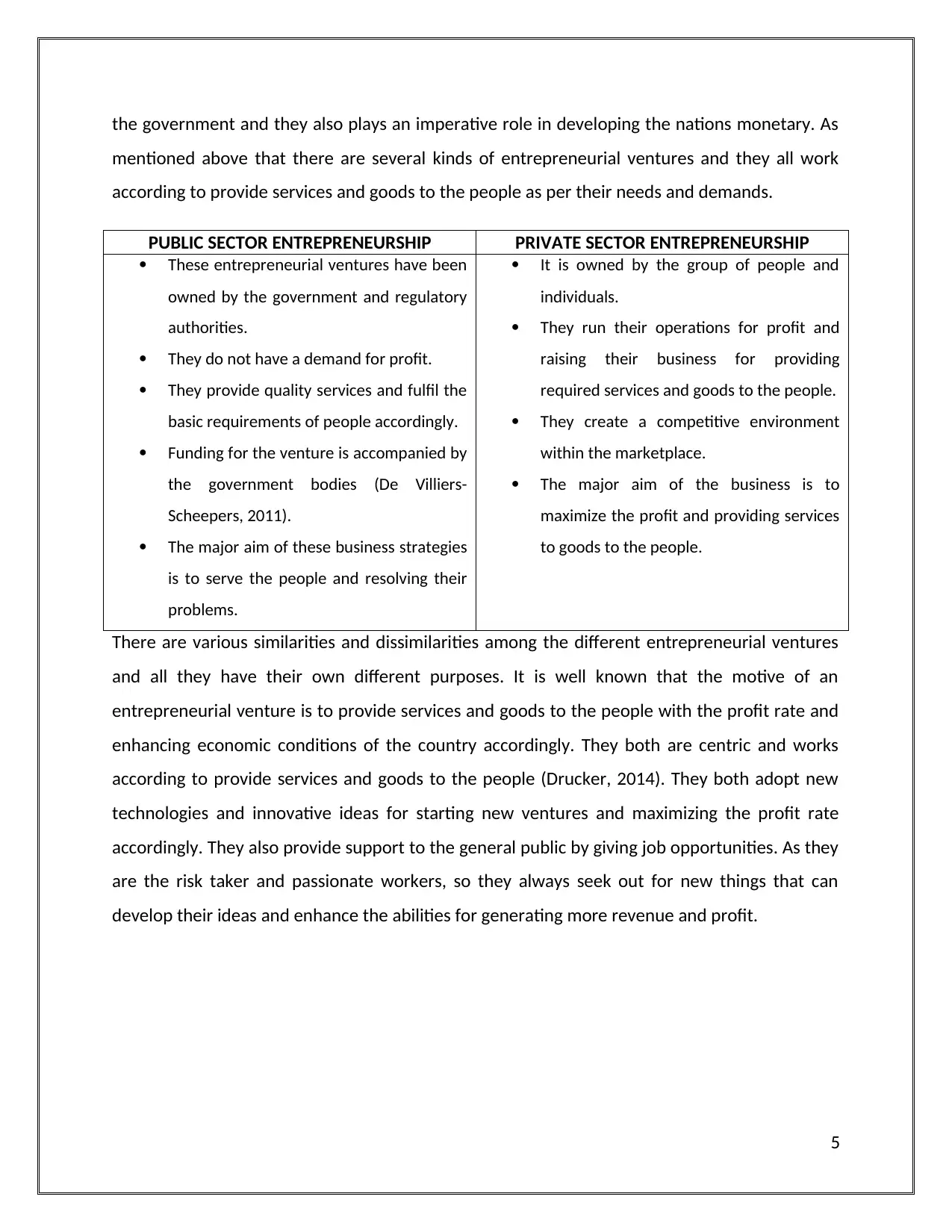
the government and they also plays an imperative role in developing the nations monetary. As
mentioned above that there are several kinds of entrepreneurial ventures and they all work
according to provide services and goods to the people as per their needs and demands.
PUBLIC SECTOR ENTREPRENEURSHIP PRIVATE SECTOR ENTREPRENEURSHIP
These entrepreneurial ventures have been
owned by the government and regulatory
authorities.
They do not have a demand for profit.
They provide quality services and fulfil the
basic requirements of people accordingly.
Funding for the venture is accompanied by
the government bodies (De Villiers-
Scheepers, 2011).
The major aim of these business strategies
is to serve the people and resolving their
problems.
It is owned by the group of people and
individuals.
They run their operations for profit and
raising their business for providing
required services and goods to the people.
They create a competitive environment
within the marketplace.
The major aim of the business is to
maximize the profit and providing services
to goods to the people.
There are various similarities and dissimilarities among the different entrepreneurial ventures
and all they have their own different purposes. It is well known that the motive of an
entrepreneurial venture is to provide services and goods to the people with the profit rate and
enhancing economic conditions of the country accordingly. They both are centric and works
according to provide services and goods to the people (Drucker, 2014). They both adopt new
technologies and innovative ideas for starting new ventures and maximizing the profit rate
accordingly. They also provide support to the general public by giving job opportunities. As they
are the risk taker and passionate workers, so they always seek out for new things that can
develop their ideas and enhance the abilities for generating more revenue and profit.
5
mentioned above that there are several kinds of entrepreneurial ventures and they all work
according to provide services and goods to the people as per their needs and demands.
PUBLIC SECTOR ENTREPRENEURSHIP PRIVATE SECTOR ENTREPRENEURSHIP
These entrepreneurial ventures have been
owned by the government and regulatory
authorities.
They do not have a demand for profit.
They provide quality services and fulfil the
basic requirements of people accordingly.
Funding for the venture is accompanied by
the government bodies (De Villiers-
Scheepers, 2011).
The major aim of these business strategies
is to serve the people and resolving their
problems.
It is owned by the group of people and
individuals.
They run their operations for profit and
raising their business for providing
required services and goods to the people.
They create a competitive environment
within the marketplace.
The major aim of the business is to
maximize the profit and providing services
to goods to the people.
There are various similarities and dissimilarities among the different entrepreneurial ventures
and all they have their own different purposes. It is well known that the motive of an
entrepreneurial venture is to provide services and goods to the people with the profit rate and
enhancing economic conditions of the country accordingly. They both are centric and works
according to provide services and goods to the people (Drucker, 2014). They both adopt new
technologies and innovative ideas for starting new ventures and maximizing the profit rate
accordingly. They also provide support to the general public by giving job opportunities. As they
are the risk taker and passionate workers, so they always seek out for new things that can
develop their ideas and enhance the abilities for generating more revenue and profit.
5
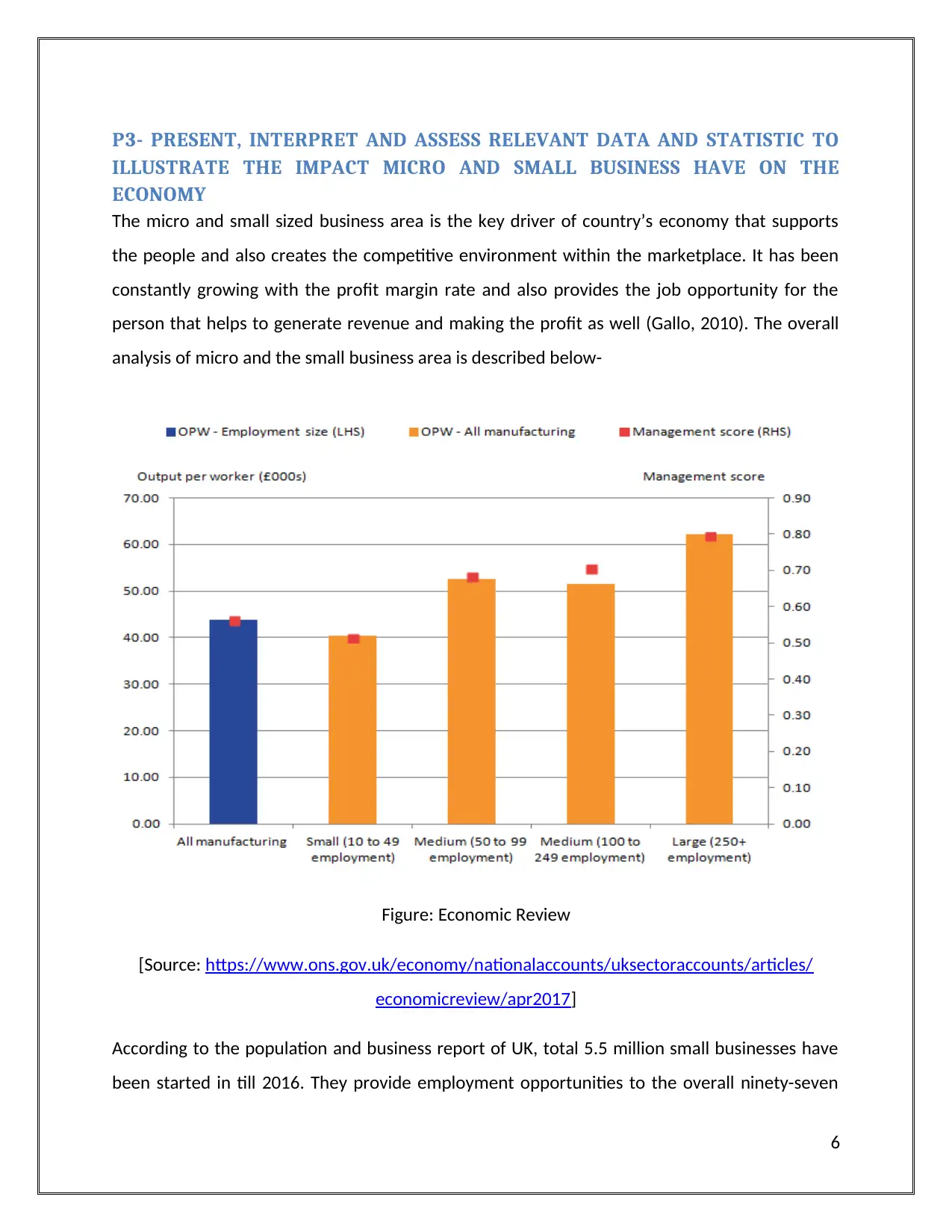
P3- PRESENT, INTERPRET AND ASSESS RELEVANT DATA AND STATISTIC TO
ILLUSTRATE THE IMPACT MICRO AND SMALL BUSINESS HAVE ON THE
ECONOMY
The micro and small sized business area is the key driver of country’s economy that supports
the people and also creates the competitive environment within the marketplace. It has been
constantly growing with the profit margin rate and also provides the job opportunity for the
person that helps to generate revenue and making the profit as well (Gallo, 2010). The overall
analysis of micro and the small business area is described below-
Figure: Economic Review
[Source: https://www.ons.gov.uk/economy/nationalaccounts/uksectoraccounts/articles/
economicreview/apr2017]
According to the population and business report of UK, total 5.5 million small businesses have
been started in till 2016. They provide employment opportunities to the overall ninety-seven
6
ILLUSTRATE THE IMPACT MICRO AND SMALL BUSINESS HAVE ON THE
ECONOMY
The micro and small sized business area is the key driver of country’s economy that supports
the people and also creates the competitive environment within the marketplace. It has been
constantly growing with the profit margin rate and also provides the job opportunity for the
person that helps to generate revenue and making the profit as well (Gallo, 2010). The overall
analysis of micro and the small business area is described below-
Figure: Economic Review
[Source: https://www.ons.gov.uk/economy/nationalaccounts/uksectoraccounts/articles/
economicreview/apr2017]
According to the population and business report of UK, total 5.5 million small businesses have
been started in till 2016. They provide employment opportunities to the overall ninety-seven
6
Paraphrase This Document
Need a fresh take? Get an instant paraphrase of this document with our AI Paraphraser
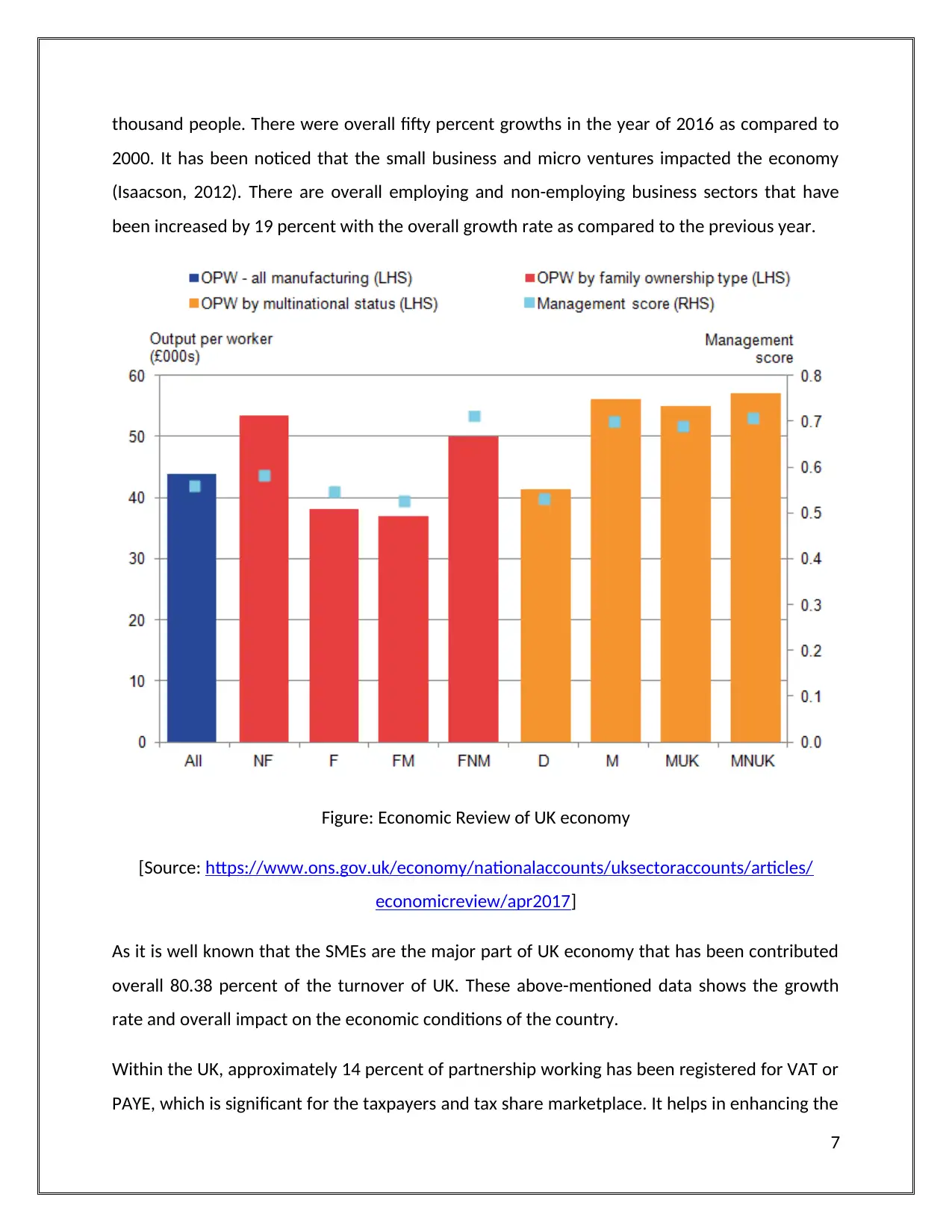
thousand people. There were overall fifty percent growths in the year of 2016 as compared to
2000. It has been noticed that the small business and micro ventures impacted the economy
(Isaacson, 2012). There are overall employing and non-employing business sectors that have
been increased by 19 percent with the overall growth rate as compared to the previous year.
Figure: Economic Review of UK economy
[Source: https://www.ons.gov.uk/economy/nationalaccounts/uksectoraccounts/articles/
economicreview/apr2017]
As it is well known that the SMEs are the major part of UK economy that has been contributed
overall 80.38 percent of the turnover of UK. These above-mentioned data shows the growth
rate and overall impact on the economic conditions of the country.
Within the UK, approximately 14 percent of partnership working has been registered for VAT or
PAYE, which is significant for the taxpayers and tax share marketplace. It helps in enhancing the
7
2000. It has been noticed that the small business and micro ventures impacted the economy
(Isaacson, 2012). There are overall employing and non-employing business sectors that have
been increased by 19 percent with the overall growth rate as compared to the previous year.
Figure: Economic Review of UK economy
[Source: https://www.ons.gov.uk/economy/nationalaccounts/uksectoraccounts/articles/
economicreview/apr2017]
As it is well known that the SMEs are the major part of UK economy that has been contributed
overall 80.38 percent of the turnover of UK. These above-mentioned data shows the growth
rate and overall impact on the economic conditions of the country.
Within the UK, approximately 14 percent of partnership working has been registered for VAT or
PAYE, which is significant for the taxpayers and tax share marketplace. It helps in enhancing the
7
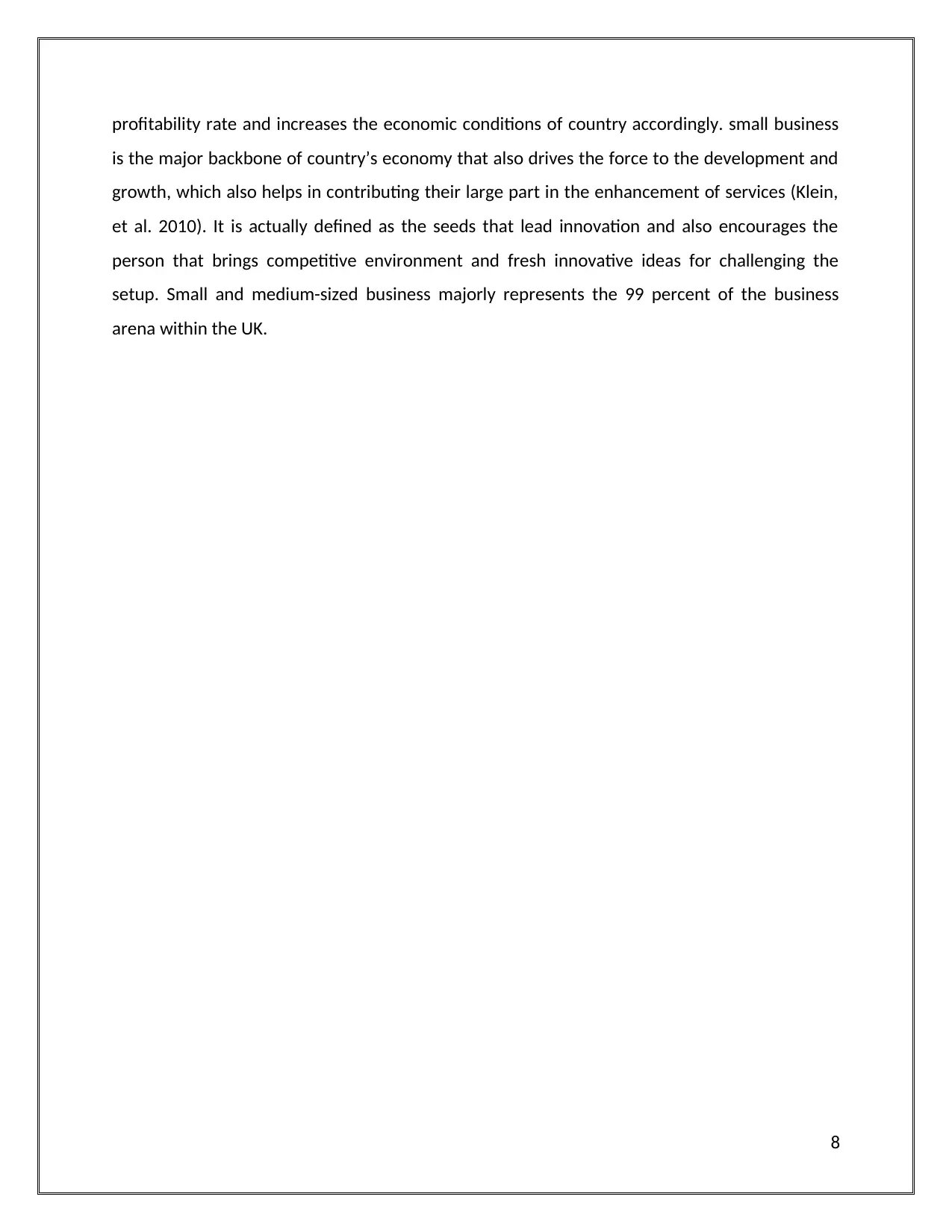
profitability rate and increases the economic conditions of country accordingly. small business
is the major backbone of country’s economy that also drives the force to the development and
growth, which also helps in contributing their large part in the enhancement of services (Klein,
et al. 2010). It is actually defined as the seeds that lead innovation and also encourages the
person that brings competitive environment and fresh innovative ideas for challenging the
setup. Small and medium-sized business majorly represents the 99 percent of the business
arena within the UK.
8
is the major backbone of country’s economy that also drives the force to the development and
growth, which also helps in contributing their large part in the enhancement of services (Klein,
et al. 2010). It is actually defined as the seeds that lead innovation and also encourages the
person that brings competitive environment and fresh innovative ideas for challenging the
setup. Small and medium-sized business majorly represents the 99 percent of the business
arena within the UK.
8
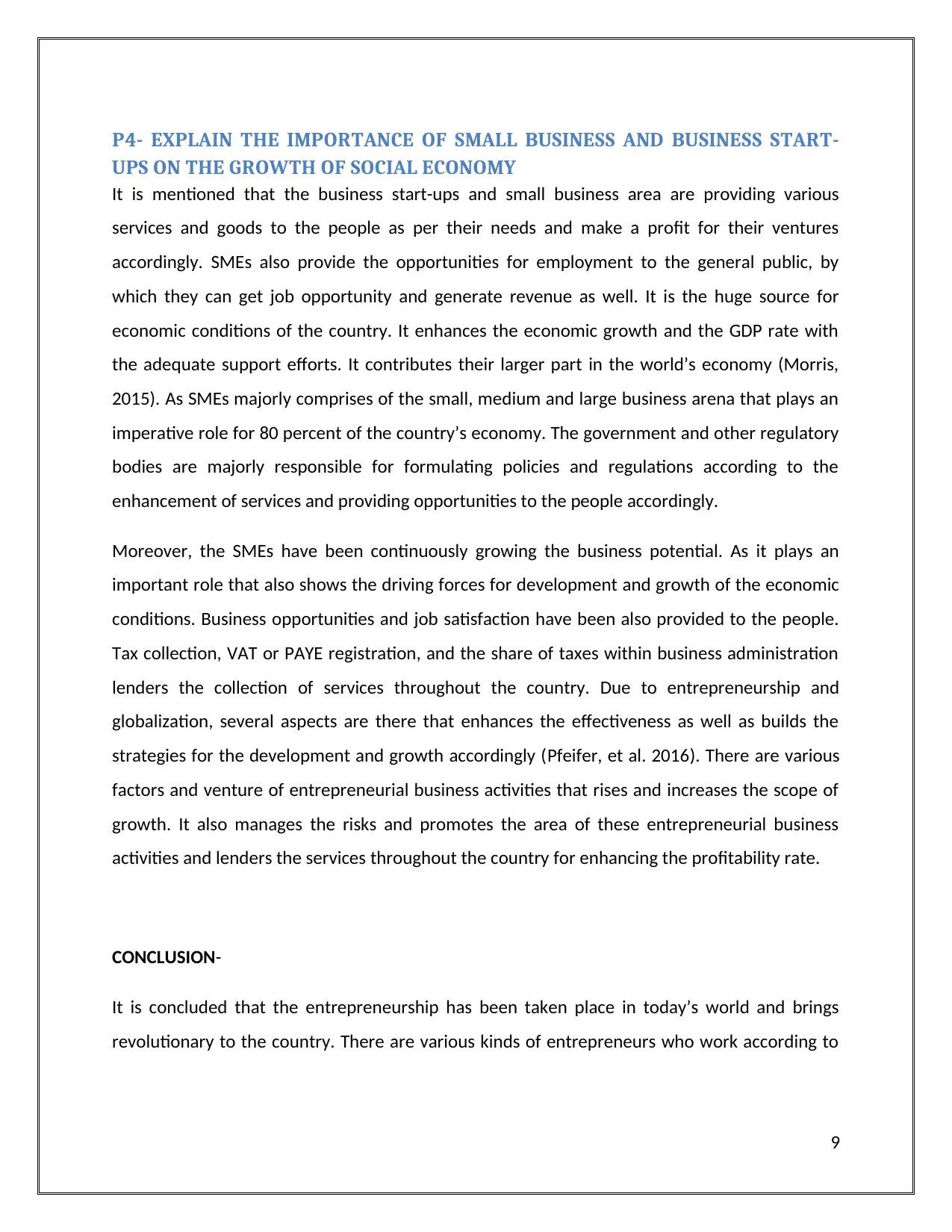
P4- EXPLAIN THE IMPORTANCE OF SMALL BUSINESS AND BUSINESS START-
UPS ON THE GROWTH OF SOCIAL ECONOMY
It is mentioned that the business start-ups and small business area are providing various
services and goods to the people as per their needs and make a profit for their ventures
accordingly. SMEs also provide the opportunities for employment to the general public, by
which they can get job opportunity and generate revenue as well. It is the huge source for
economic conditions of the country. It enhances the economic growth and the GDP rate with
the adequate support efforts. It contributes their larger part in the world’s economy (Morris,
2015). As SMEs majorly comprises of the small, medium and large business arena that plays an
imperative role for 80 percent of the country’s economy. The government and other regulatory
bodies are majorly responsible for formulating policies and regulations according to the
enhancement of services and providing opportunities to the people accordingly.
Moreover, the SMEs have been continuously growing the business potential. As it plays an
important role that also shows the driving forces for development and growth of the economic
conditions. Business opportunities and job satisfaction have been also provided to the people.
Tax collection, VAT or PAYE registration, and the share of taxes within business administration
lenders the collection of services throughout the country. Due to entrepreneurship and
globalization, several aspects are there that enhances the effectiveness as well as builds the
strategies for the development and growth accordingly (Pfeifer, et al. 2016). There are various
factors and venture of entrepreneurial business activities that rises and increases the scope of
growth. It also manages the risks and promotes the area of these entrepreneurial business
activities and lenders the services throughout the country for enhancing the profitability rate.
CONCLUSION-
It is concluded that the entrepreneurship has been taken place in today’s world and brings
revolutionary to the country. There are various kinds of entrepreneurs who work according to
9
UPS ON THE GROWTH OF SOCIAL ECONOMY
It is mentioned that the business start-ups and small business area are providing various
services and goods to the people as per their needs and make a profit for their ventures
accordingly. SMEs also provide the opportunities for employment to the general public, by
which they can get job opportunity and generate revenue as well. It is the huge source for
economic conditions of the country. It enhances the economic growth and the GDP rate with
the adequate support efforts. It contributes their larger part in the world’s economy (Morris,
2015). As SMEs majorly comprises of the small, medium and large business arena that plays an
imperative role for 80 percent of the country’s economy. The government and other regulatory
bodies are majorly responsible for formulating policies and regulations according to the
enhancement of services and providing opportunities to the people accordingly.
Moreover, the SMEs have been continuously growing the business potential. As it plays an
important role that also shows the driving forces for development and growth of the economic
conditions. Business opportunities and job satisfaction have been also provided to the people.
Tax collection, VAT or PAYE registration, and the share of taxes within business administration
lenders the collection of services throughout the country. Due to entrepreneurship and
globalization, several aspects are there that enhances the effectiveness as well as builds the
strategies for the development and growth accordingly (Pfeifer, et al. 2016). There are various
factors and venture of entrepreneurial business activities that rises and increases the scope of
growth. It also manages the risks and promotes the area of these entrepreneurial business
activities and lenders the services throughout the country for enhancing the profitability rate.
CONCLUSION-
It is concluded that the entrepreneurship has been taken place in today’s world and brings
revolutionary to the country. There are various kinds of entrepreneurs who work according to
9
Secure Best Marks with AI Grader
Need help grading? Try our AI Grader for instant feedback on your assignments.
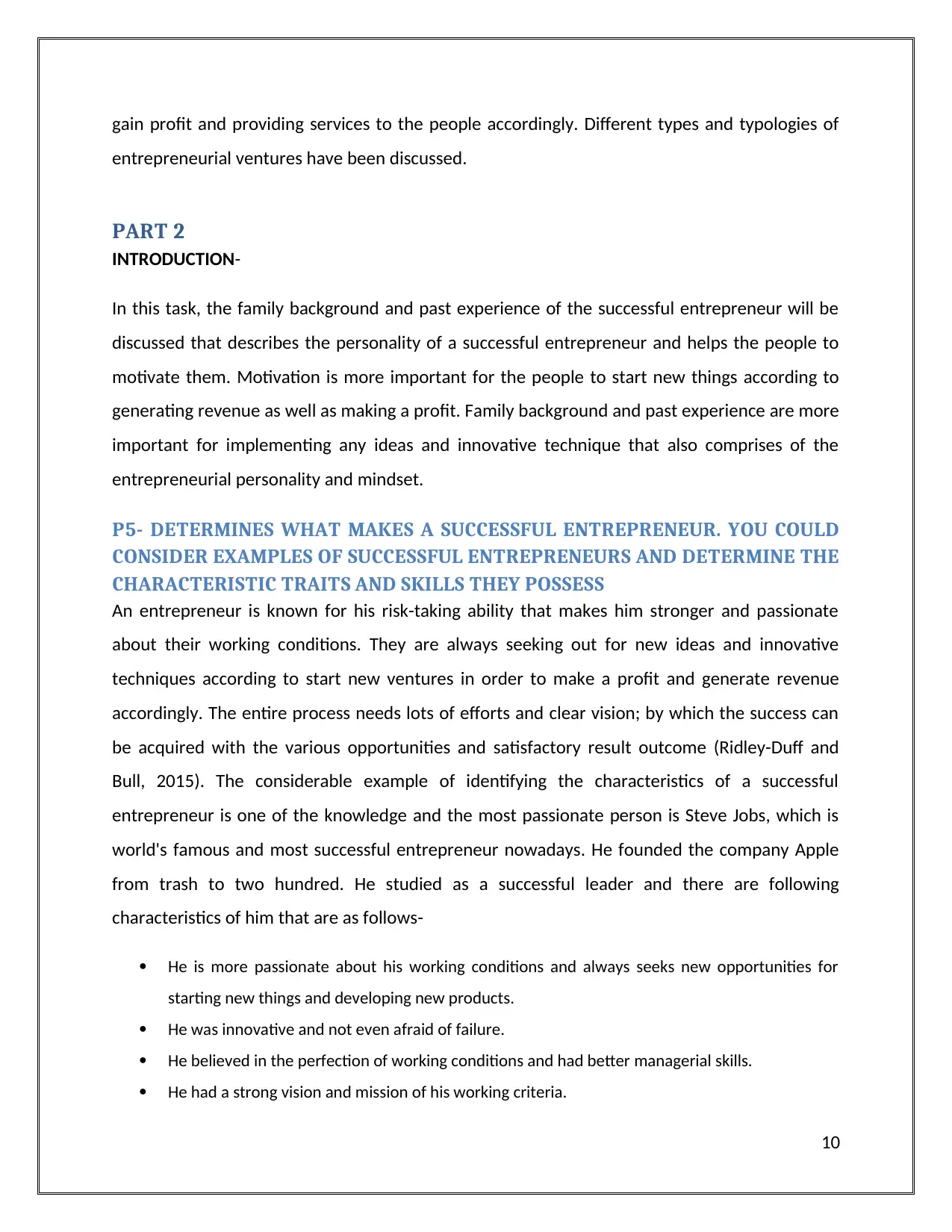
gain profit and providing services to the people accordingly. Different types and typologies of
entrepreneurial ventures have been discussed.
PART 2
INTRODUCTION-
In this task, the family background and past experience of the successful entrepreneur will be
discussed that describes the personality of a successful entrepreneur and helps the people to
motivate them. Motivation is more important for the people to start new things according to
generating revenue as well as making a profit. Family background and past experience are more
important for implementing any ideas and innovative technique that also comprises of the
entrepreneurial personality and mindset.
P5- DETERMINES WHAT MAKES A SUCCESSFUL ENTREPRENEUR. YOU COULD
CONSIDER EXAMPLES OF SUCCESSFUL ENTREPRENEURS AND DETERMINE THE
CHARACTERISTIC TRAITS AND SKILLS THEY POSSESS
An entrepreneur is known for his risk-taking ability that makes him stronger and passionate
about their working conditions. They are always seeking out for new ideas and innovative
techniques according to start new ventures in order to make a profit and generate revenue
accordingly. The entire process needs lots of efforts and clear vision; by which the success can
be acquired with the various opportunities and satisfactory result outcome (Ridley-Duff and
Bull, 2015). The considerable example of identifying the characteristics of a successful
entrepreneur is one of the knowledge and the most passionate person is Steve Jobs, which is
world's famous and most successful entrepreneur nowadays. He founded the company Apple
from trash to two hundred. He studied as a successful leader and there are following
characteristics of him that are as follows-
He is more passionate about his working conditions and always seeks new opportunities for
starting new things and developing new products.
He was innovative and not even afraid of failure.
He believed in the perfection of working conditions and had better managerial skills.
He had a strong vision and mission of his working criteria.
10
entrepreneurial ventures have been discussed.
PART 2
INTRODUCTION-
In this task, the family background and past experience of the successful entrepreneur will be
discussed that describes the personality of a successful entrepreneur and helps the people to
motivate them. Motivation is more important for the people to start new things according to
generating revenue as well as making a profit. Family background and past experience are more
important for implementing any ideas and innovative technique that also comprises of the
entrepreneurial personality and mindset.
P5- DETERMINES WHAT MAKES A SUCCESSFUL ENTREPRENEUR. YOU COULD
CONSIDER EXAMPLES OF SUCCESSFUL ENTREPRENEURS AND DETERMINE THE
CHARACTERISTIC TRAITS AND SKILLS THEY POSSESS
An entrepreneur is known for his risk-taking ability that makes him stronger and passionate
about their working conditions. They are always seeking out for new ideas and innovative
techniques according to start new ventures in order to make a profit and generate revenue
accordingly. The entire process needs lots of efforts and clear vision; by which the success can
be acquired with the various opportunities and satisfactory result outcome (Ridley-Duff and
Bull, 2015). The considerable example of identifying the characteristics of a successful
entrepreneur is one of the knowledge and the most passionate person is Steve Jobs, which is
world's famous and most successful entrepreneur nowadays. He founded the company Apple
from trash to two hundred. He studied as a successful leader and there are following
characteristics of him that are as follows-
He is more passionate about his working conditions and always seeks new opportunities for
starting new things and developing new products.
He was innovative and not even afraid of failure.
He believed in the perfection of working conditions and had better managerial skills.
He had a strong vision and mission of his working criteria.
10
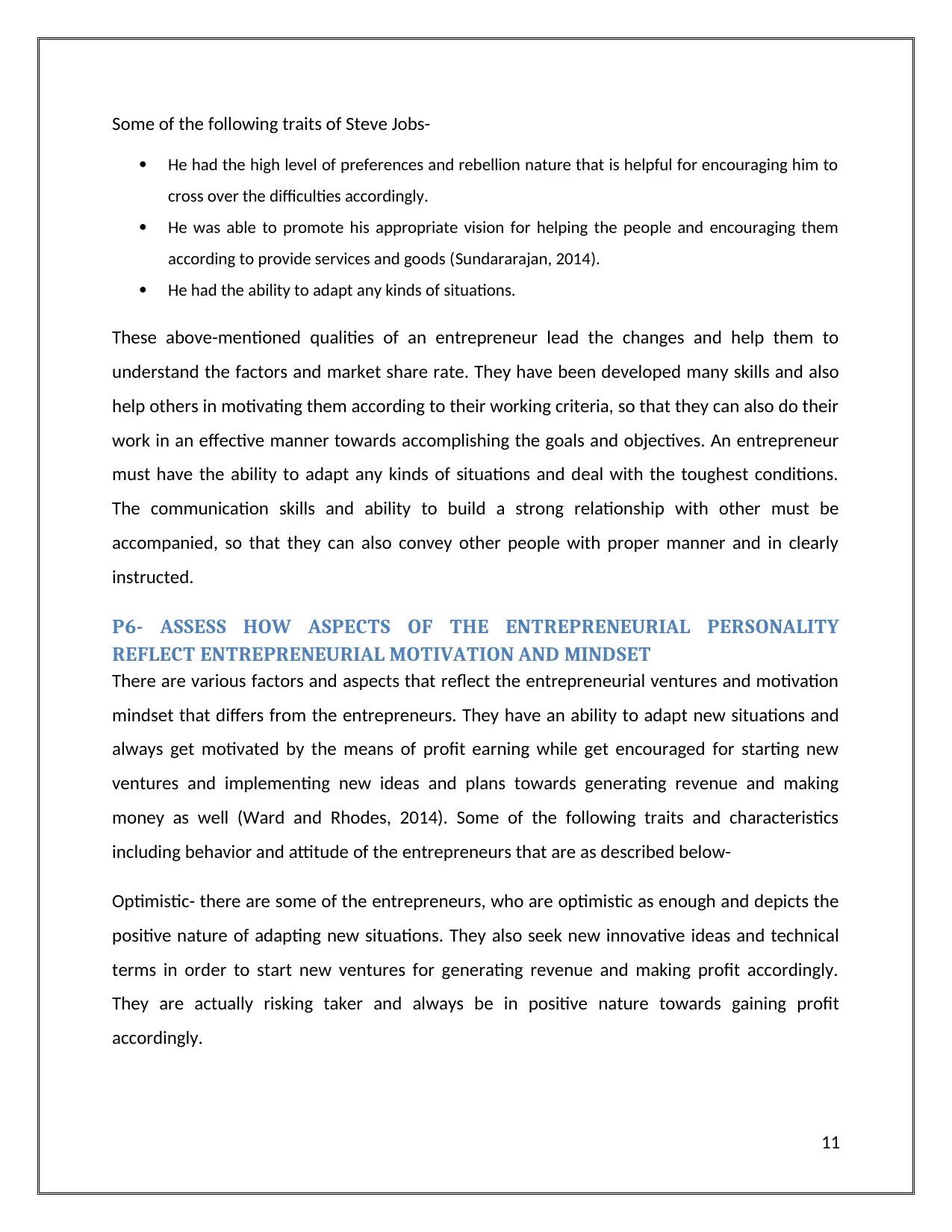
Some of the following traits of Steve Jobs-
He had the high level of preferences and rebellion nature that is helpful for encouraging him to
cross over the difficulties accordingly.
He was able to promote his appropriate vision for helping the people and encouraging them
according to provide services and goods (Sundararajan, 2014).
He had the ability to adapt any kinds of situations.
These above-mentioned qualities of an entrepreneur lead the changes and help them to
understand the factors and market share rate. They have been developed many skills and also
help others in motivating them according to their working criteria, so that they can also do their
work in an effective manner towards accomplishing the goals and objectives. An entrepreneur
must have the ability to adapt any kinds of situations and deal with the toughest conditions.
The communication skills and ability to build a strong relationship with other must be
accompanied, so that they can also convey other people with proper manner and in clearly
instructed.
P6- ASSESS HOW ASPECTS OF THE ENTREPRENEURIAL PERSONALITY
REFLECT ENTREPRENEURIAL MOTIVATION AND MINDSET
There are various factors and aspects that reflect the entrepreneurial ventures and motivation
mindset that differs from the entrepreneurs. They have an ability to adapt new situations and
always get motivated by the means of profit earning while get encouraged for starting new
ventures and implementing new ideas and plans towards generating revenue and making
money as well (Ward and Rhodes, 2014). Some of the following traits and characteristics
including behavior and attitude of the entrepreneurs that are as described below-
Optimistic- there are some of the entrepreneurs, who are optimistic as enough and depicts the
positive nature of adapting new situations. They also seek new innovative ideas and technical
terms in order to start new ventures for generating revenue and making profit accordingly.
They are actually risking taker and always be in positive nature towards gaining profit
accordingly.
11
He had the high level of preferences and rebellion nature that is helpful for encouraging him to
cross over the difficulties accordingly.
He was able to promote his appropriate vision for helping the people and encouraging them
according to provide services and goods (Sundararajan, 2014).
He had the ability to adapt any kinds of situations.
These above-mentioned qualities of an entrepreneur lead the changes and help them to
understand the factors and market share rate. They have been developed many skills and also
help others in motivating them according to their working criteria, so that they can also do their
work in an effective manner towards accomplishing the goals and objectives. An entrepreneur
must have the ability to adapt any kinds of situations and deal with the toughest conditions.
The communication skills and ability to build a strong relationship with other must be
accompanied, so that they can also convey other people with proper manner and in clearly
instructed.
P6- ASSESS HOW ASPECTS OF THE ENTREPRENEURIAL PERSONALITY
REFLECT ENTREPRENEURIAL MOTIVATION AND MINDSET
There are various factors and aspects that reflect the entrepreneurial ventures and motivation
mindset that differs from the entrepreneurs. They have an ability to adapt new situations and
always get motivated by the means of profit earning while get encouraged for starting new
ventures and implementing new ideas and plans towards generating revenue and making
money as well (Ward and Rhodes, 2014). Some of the following traits and characteristics
including behavior and attitude of the entrepreneurs that are as described below-
Optimistic- there are some of the entrepreneurs, who are optimistic as enough and depicts the
positive nature of adapting new situations. They also seek new innovative ideas and technical
terms in order to start new ventures for generating revenue and making profit accordingly.
They are actually risking taker and always be in positive nature towards gaining profit
accordingly.
11

Unbiased- they are belonging from what kinds of family background, who have an impartial
nature and helps them to remain bias-free with each and every one in diverse situations
accordingly.
Introvert- some of the family members and people are more likely to tend to fewer focuses on
the open discussions and leads strong communication with the other entrepreneurs and other
people, so that they can easily do their works in an effective manner towards maintaining
sustainability. The introvert personality of the people helps them to encouraged themselves for
their working criteria accordingly (Zhao, 2016).
Observant- they are very observing kind of nature and observes each and everything then
makes the plan for implementing it in an effective manner towards gaining profit and enhancing
the effectiveness accordingly. They are very careful and aware of things throughout making
decisions for starting ventures and generating revenue by providing such required services and
goods to the people.
Dependable- some of the people come from that type of family background, where they are
very dependent on another person for making plans and implementing ideas accordingly. They
take advice from others in order to start something new.
Extrovert- they are very open in nature and communicate to others in an effective manner
towards making ideas and implementing the plans according to gain profit and generating
revenue.
Well-cultured- they believe in values and personalities of cultured people and do their works in
a good manner (Burns, 2016). They always make plans in the proper manner and
communicate it to implementing in a perfect order.
Independent- they are very open and independent to make any decision and plans according to
start new ventures and implementing ideas according to gain profit. They are very free in
nature and seek out with different innovative techniques towards accomplishing goals and
objectives.
12
nature and helps them to remain bias-free with each and every one in diverse situations
accordingly.
Introvert- some of the family members and people are more likely to tend to fewer focuses on
the open discussions and leads strong communication with the other entrepreneurs and other
people, so that they can easily do their works in an effective manner towards maintaining
sustainability. The introvert personality of the people helps them to encouraged themselves for
their working criteria accordingly (Zhao, 2016).
Observant- they are very observing kind of nature and observes each and everything then
makes the plan for implementing it in an effective manner towards gaining profit and enhancing
the effectiveness accordingly. They are very careful and aware of things throughout making
decisions for starting ventures and generating revenue by providing such required services and
goods to the people.
Dependable- some of the people come from that type of family background, where they are
very dependent on another person for making plans and implementing ideas accordingly. They
take advice from others in order to start something new.
Extrovert- they are very open in nature and communicate to others in an effective manner
towards making ideas and implementing the plans according to gain profit and generating
revenue.
Well-cultured- they believe in values and personalities of cultured people and do their works in
a good manner (Burns, 2016). They always make plans in the proper manner and
communicate it to implementing in a perfect order.
Independent- they are very open and independent to make any decision and plans according to
start new ventures and implementing ideas according to gain profit. They are very free in
nature and seek out with different innovative techniques towards accomplishing goals and
objectives.
12
Paraphrase This Document
Need a fresh take? Get an instant paraphrase of this document with our AI Paraphraser
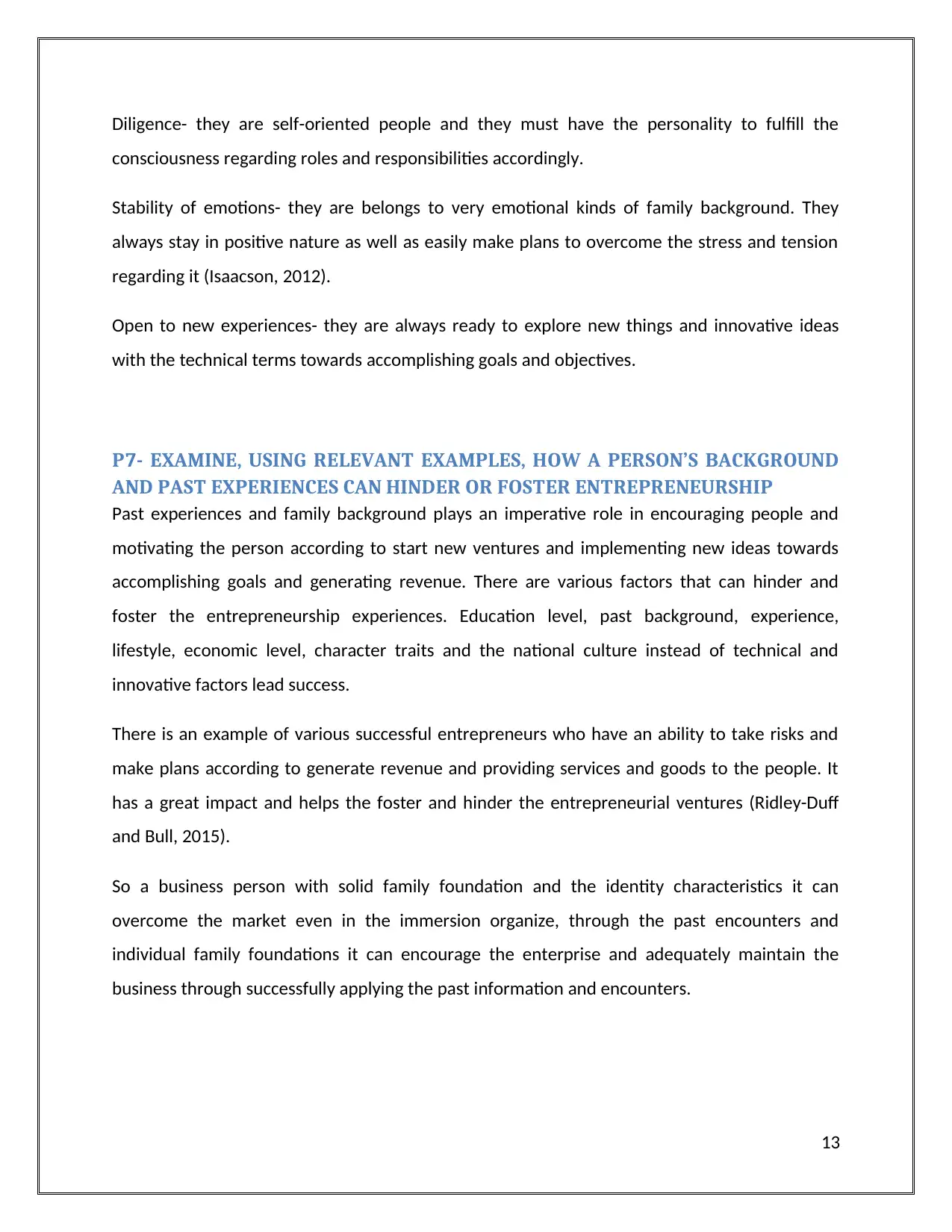
Diligence- they are self-oriented people and they must have the personality to fulfill the
consciousness regarding roles and responsibilities accordingly.
Stability of emotions- they are belongs to very emotional kinds of family background. They
always stay in positive nature as well as easily make plans to overcome the stress and tension
regarding it (Isaacson, 2012).
Open to new experiences- they are always ready to explore new things and innovative ideas
with the technical terms towards accomplishing goals and objectives.
P7- EXAMINE, USING RELEVANT EXAMPLES, HOW A PERSON’S BACKGROUND
AND PAST EXPERIENCES CAN HINDER OR FOSTER ENTREPRENEURSHIP
Past experiences and family background plays an imperative role in encouraging people and
motivating the person according to start new ventures and implementing new ideas towards
accomplishing goals and generating revenue. There are various factors that can hinder and
foster the entrepreneurship experiences. Education level, past background, experience,
lifestyle, economic level, character traits and the national culture instead of technical and
innovative factors lead success.
There is an example of various successful entrepreneurs who have an ability to take risks and
make plans according to generate revenue and providing services and goods to the people. It
has a great impact and helps the foster and hinder the entrepreneurial ventures (Ridley-Duff
and Bull, 2015).
So a business person with solid family foundation and the identity characteristics it can
overcome the market even in the immersion organize, through the past encounters and
individual family foundations it can encourage the enterprise and adequately maintain the
business through successfully applying the past information and encounters.
13
consciousness regarding roles and responsibilities accordingly.
Stability of emotions- they are belongs to very emotional kinds of family background. They
always stay in positive nature as well as easily make plans to overcome the stress and tension
regarding it (Isaacson, 2012).
Open to new experiences- they are always ready to explore new things and innovative ideas
with the technical terms towards accomplishing goals and objectives.
P7- EXAMINE, USING RELEVANT EXAMPLES, HOW A PERSON’S BACKGROUND
AND PAST EXPERIENCES CAN HINDER OR FOSTER ENTREPRENEURSHIP
Past experiences and family background plays an imperative role in encouraging people and
motivating the person according to start new ventures and implementing new ideas towards
accomplishing goals and generating revenue. There are various factors that can hinder and
foster the entrepreneurship experiences. Education level, past background, experience,
lifestyle, economic level, character traits and the national culture instead of technical and
innovative factors lead success.
There is an example of various successful entrepreneurs who have an ability to take risks and
make plans according to generate revenue and providing services and goods to the people. It
has a great impact and helps the foster and hinder the entrepreneurial ventures (Ridley-Duff
and Bull, 2015).
So a business person with solid family foundation and the identity characteristics it can
overcome the market even in the immersion organize, through the past encounters and
individual family foundations it can encourage the enterprise and adequately maintain the
business through successfully applying the past information and encounters.
13
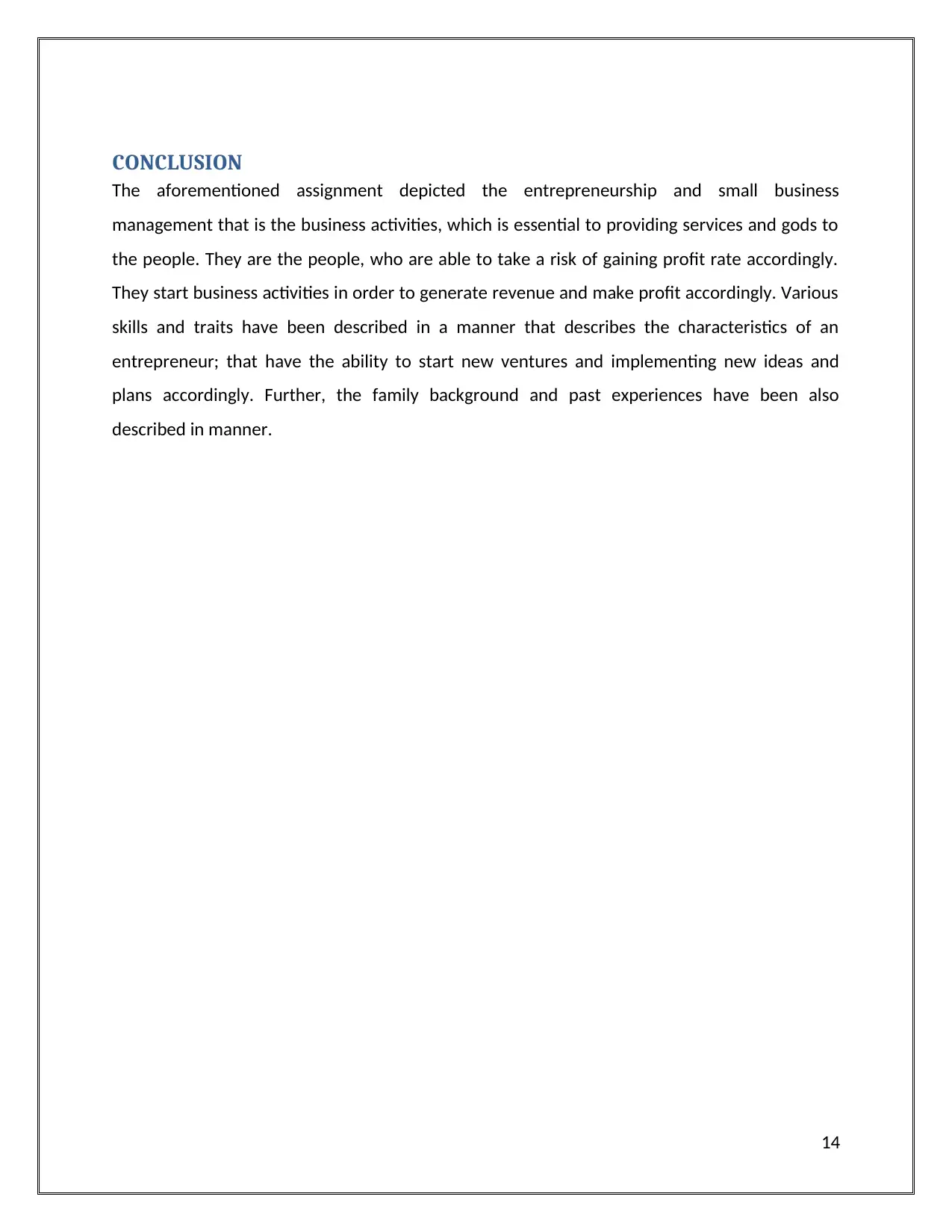
CONCLUSION
The aforementioned assignment depicted the entrepreneurship and small business
management that is the business activities, which is essential to providing services and gods to
the people. They are the people, who are able to take a risk of gaining profit rate accordingly.
They start business activities in order to generate revenue and make profit accordingly. Various
skills and traits have been described in a manner that describes the characteristics of an
entrepreneur; that have the ability to start new ventures and implementing new ideas and
plans accordingly. Further, the family background and past experiences have been also
described in manner.
14
The aforementioned assignment depicted the entrepreneurship and small business
management that is the business activities, which is essential to providing services and gods to
the people. They are the people, who are able to take a risk of gaining profit rate accordingly.
They start business activities in order to generate revenue and make profit accordingly. Various
skills and traits have been described in a manner that describes the characteristics of an
entrepreneur; that have the ability to start new ventures and implementing new ideas and
plans accordingly. Further, the family background and past experiences have been also
described in manner.
14
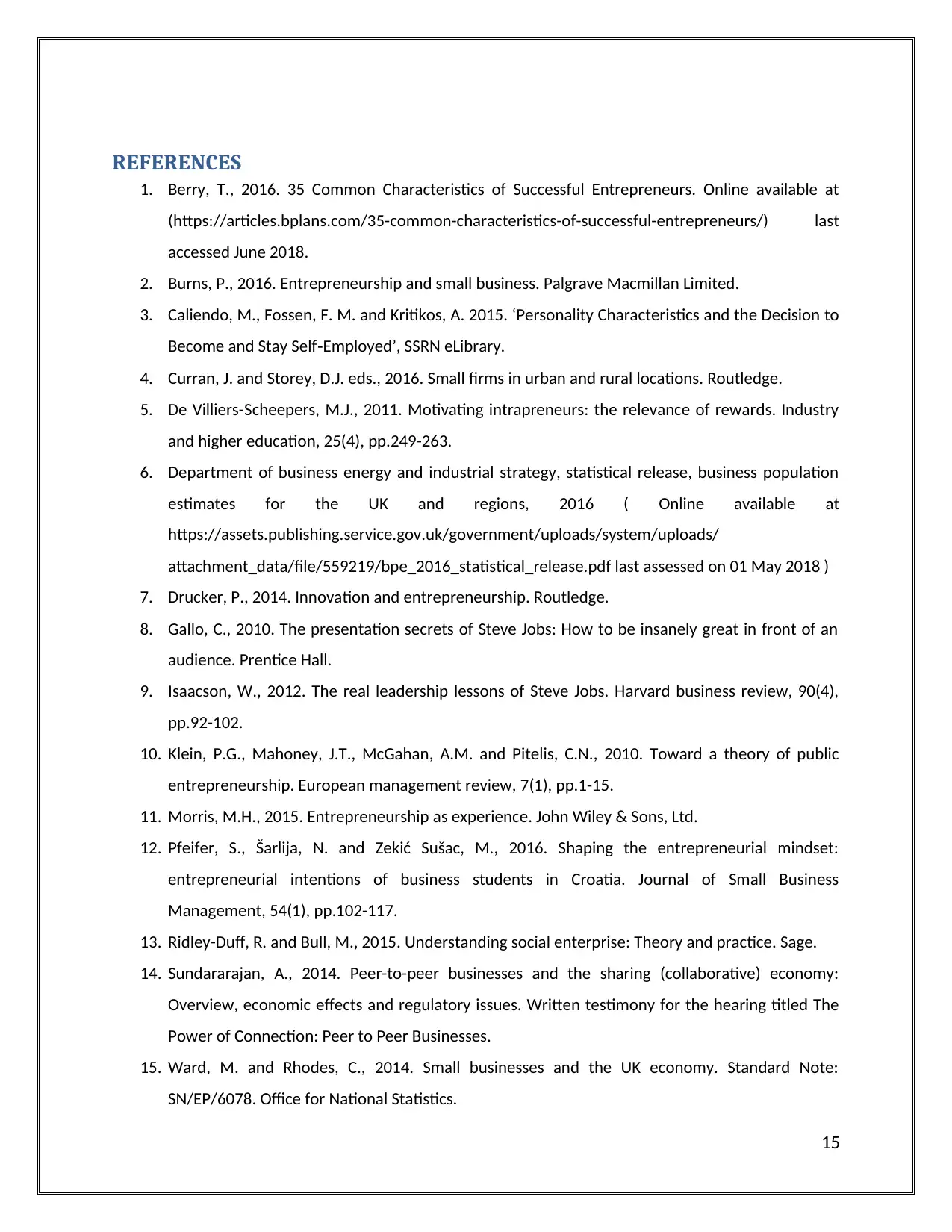
REFERENCES
1. Berry, T., 2016. 35 Common Characteristics of Successful Entrepreneurs. Online available at
(https://articles.bplans.com/35-common-characteristics-of-successful-entrepreneurs/) last
accessed June 2018.
2. Burns, P., 2016. Entrepreneurship and small business. Palgrave Macmillan Limited.
3. Caliendo, M., Fossen, F. M. and Kritikos, A. 2015. ‘Personality Characteristics and the Decision to
Become and Stay Self‐Employed’, SSRN eLibrary.
4. Curran, J. and Storey, D.J. eds., 2016. Small firms in urban and rural locations. Routledge.
5. De Villiers-Scheepers, M.J., 2011. Motivating intrapreneurs: the relevance of rewards. Industry
and higher education, 25(4), pp.249-263.
6. Department of business energy and industrial strategy, statistical release, business population
estimates for the UK and regions, 2016 ( Online available at
https://assets.publishing.service.gov.uk/government/uploads/system/uploads/
attachment_data/file/559219/bpe_2016_statistical_release.pdf last assessed on 01 May 2018 )
7. Drucker, P., 2014. Innovation and entrepreneurship. Routledge.
8. Gallo, C., 2010. The presentation secrets of Steve Jobs: How to be insanely great in front of an
audience. Prentice Hall.
9. Isaacson, W., 2012. The real leadership lessons of Steve Jobs. Harvard business review, 90(4),
pp.92-102.
10. Klein, P.G., Mahoney, J.T., McGahan, A.M. and Pitelis, C.N., 2010. Toward a theory of public
entrepreneurship. European management review, 7(1), pp.1-15.
11. Morris, M.H., 2015. Entrepreneurship as experience. John Wiley & Sons, Ltd.
12. Pfeifer, S., Šarlija, N. and Zekić Sušac, M., 2016. Shaping the entrepreneurial mindset:
entrepreneurial intentions of business students in Croatia. Journal of Small Business
Management, 54(1), pp.102-117.
13. Ridley-Duff, R. and Bull, M., 2015. Understanding social enterprise: Theory and practice. Sage.
14. Sundararajan, A., 2014. Peer-to-peer businesses and the sharing (collaborative) economy:
Overview, economic effects and regulatory issues. Written testimony for the hearing titled The
Power of Connection: Peer to Peer Businesses.
15. Ward, M. and Rhodes, C., 2014. Small businesses and the UK economy. Standard Note:
SN/EP/6078. Office for National Statistics.
15
1. Berry, T., 2016. 35 Common Characteristics of Successful Entrepreneurs. Online available at
(https://articles.bplans.com/35-common-characteristics-of-successful-entrepreneurs/) last
accessed June 2018.
2. Burns, P., 2016. Entrepreneurship and small business. Palgrave Macmillan Limited.
3. Caliendo, M., Fossen, F. M. and Kritikos, A. 2015. ‘Personality Characteristics and the Decision to
Become and Stay Self‐Employed’, SSRN eLibrary.
4. Curran, J. and Storey, D.J. eds., 2016. Small firms in urban and rural locations. Routledge.
5. De Villiers-Scheepers, M.J., 2011. Motivating intrapreneurs: the relevance of rewards. Industry
and higher education, 25(4), pp.249-263.
6. Department of business energy and industrial strategy, statistical release, business population
estimates for the UK and regions, 2016 ( Online available at
https://assets.publishing.service.gov.uk/government/uploads/system/uploads/
attachment_data/file/559219/bpe_2016_statistical_release.pdf last assessed on 01 May 2018 )
7. Drucker, P., 2014. Innovation and entrepreneurship. Routledge.
8. Gallo, C., 2010. The presentation secrets of Steve Jobs: How to be insanely great in front of an
audience. Prentice Hall.
9. Isaacson, W., 2012. The real leadership lessons of Steve Jobs. Harvard business review, 90(4),
pp.92-102.
10. Klein, P.G., Mahoney, J.T., McGahan, A.M. and Pitelis, C.N., 2010. Toward a theory of public
entrepreneurship. European management review, 7(1), pp.1-15.
11. Morris, M.H., 2015. Entrepreneurship as experience. John Wiley & Sons, Ltd.
12. Pfeifer, S., Šarlija, N. and Zekić Sušac, M., 2016. Shaping the entrepreneurial mindset:
entrepreneurial intentions of business students in Croatia. Journal of Small Business
Management, 54(1), pp.102-117.
13. Ridley-Duff, R. and Bull, M., 2015. Understanding social enterprise: Theory and practice. Sage.
14. Sundararajan, A., 2014. Peer-to-peer businesses and the sharing (collaborative) economy:
Overview, economic effects and regulatory issues. Written testimony for the hearing titled The
Power of Connection: Peer to Peer Businesses.
15. Ward, M. and Rhodes, C., 2014. Small businesses and the UK economy. Standard Note:
SN/EP/6078. Office for National Statistics.
15
Secure Best Marks with AI Grader
Need help grading? Try our AI Grader for instant feedback on your assignments.

16. Zhao, Y., 2016. ENTREPRENEURIAL MINDSET. Education for Sustainable Happiness and Well-
Being, p.66.
16
Being, p.66.
16
1 out of 17
Related Documents
Your All-in-One AI-Powered Toolkit for Academic Success.
+13062052269
info@desklib.com
Available 24*7 on WhatsApp / Email
![[object Object]](/_next/static/media/star-bottom.7253800d.svg)
Unlock your academic potential
© 2024 | Zucol Services PVT LTD | All rights reserved.




